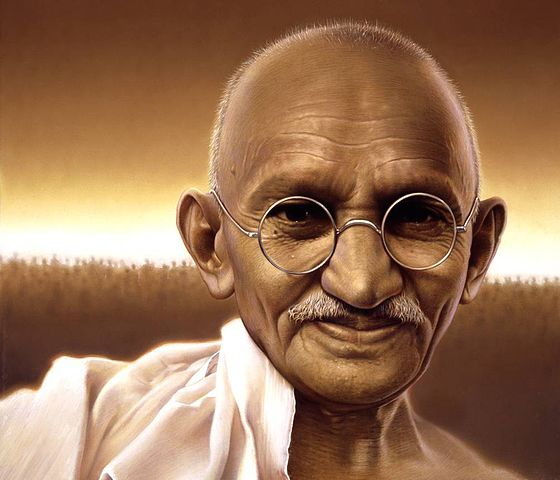Life is winning the battle, the abortion crusaders are gradually losing. The women they subjugate with their propaganda and the babies they butcher with their knives and chemicals cry out for freedom from this slavery and death.
In the broad horizons of history, life conquers death, truth overcomes lies and good vanquishes evil.
In my reading last night I heard three unlikely pro-life voices. One was Grace Carr in her article, Science Is Revolutionizing Arguments Against Abortion. More on this below.
 The other two were the rapper, Eminem, and the hero of the non-violence movement, Mahatma Gandhi. In an article by Mary Eberstadt titled, Eminem and Gandhi Are Right: The future will lean pro-life, the writer argues that these two improbable bedfellows promote a pro-life message.
The other two were the rapper, Eminem, and the hero of the non-violence movement, Mahatma Gandhi. In an article by Mary Eberstadt titled, Eminem and Gandhi Are Right: The future will lean pro-life, the writer argues that these two improbable bedfellows promote a pro-life message.
First, let’s hear from Eminem. His new album Revival … unveiled last month to ubiquitous notices. That’s small wonder, for two reasons: First, because Eminem is an uncannily gifted wordsmith, above all in feminine rhyme/assonance, who never fails to deliver novel verse; and second, because most of the album’s themes are either guaranteed fan-base pleasers (vintage soundings of domestic and social grievances); or squarely in the political safety zone (attacking Donald Trump).
What is something of a wonder is the track on that album called “River”—an anthem variously sung and rapped by Ed Sheeran and Eminem. In it, a male narrator who’s a self-described “liar,” “thief,” and “cheat” looks back on exploiting one particular woman, then living with the knowledge of her abortion.
Note, first, that there is no sanitized “reproductive freedom” here. Instead, the vicar of rap deploys the progressive equivalent of both the b-word—“I made you terminate my baby”—and the c-word—the song ends with, “what’s one more lie to tell our unborn child?”
“Didn’t really wanna abort,” the narrator further explains. Maybe that’s why the New York Times didn’t even mention “River” in an otherwise detailed review of the album; and why SPIN, though criticizing the track for several paragraphs on ostensibly musical/rap grounds, managed somehow not to mention the abortion at all. Measured by mores in the entertainment industry, “River” might be the most subversive song ever from an artist whose entire career has been defined by transgression.
Eberstadt says that other pro-life ballads have also come from music genres young people enjoy.
As it happens, both rock and rap have strayed from secular dogma on abortion before, beginning with the Sex Pistols’ still-shocking 1977 “Bodies.” (In which an apostrophized fetus yells, “I’m not an animal!” at “Mummy.”) There’s also African reggae star Alpha Blondy’s 1994 “Abortion is a Crime,” which opens with the sounds of a baby’s voice (“Jah say don’t let His children cry”); Kid Rock’s 2000 track “Abortion,” whose narrator ponders suicide upon realizing what he’s done (“I know your brothers and your sister and your mother too/Man I wish you could see them too”); alternative rock group Ben Folds Five’s ambiguous 1997 “Brick,” about a high-school sweetheart; and several numbers by Leonard Cohen that perennially annoy his progressive fans, including the 1992 song “The Future,” whose lyrics include: “Destroy another fetus now / We don’t like children anyhow / I’ve seen the future, baby / It is murder.”
From modern Western rock and rap stars, Eberstadt now channels a voice from the East, a voice from another generation, Mahatma Gandhi:
In a collection of his works called All Men are Brothers, Gandhi counsels a young husband presenting a particularly thorny situation: his wife was impregnated by someone else while the husband was traveling, and now his family is urging abortion as the only way of saving face. While acknowledging that cases like these aren’t rare, Gandhi remains true to the principle of anti-violence. “The essence of goodness is: to preserve life, promote life, help life to achieve its highest destiny,” he tells the husband. “The essence of evil is: destroy life, harm life, and hamper the development of life. . . . It seems to me as clear as daylight that abortion would be a crime.”
 Gandhi counseled that the ultimate virtue is the promotion of life, even in the case of rape (as we have written about here). So, from Gandhi, those who esteem the value of life in puppies, Arctic seal pups and whales, need to understand that life is found in abundance in the human species.
Gandhi counseled that the ultimate virtue is the promotion of life, even in the case of rape (as we have written about here). So, from Gandhi, those who esteem the value of life in puppies, Arctic seal pups and whales, need to understand that life is found in abundance in the human species.
Eberstadt points out that Gandhi condemned the evil of rich, white Western elites pushing sexual colonialism on the non-white peoples of the world.
Gandhi also understood, and condemned, the practice of rich Westerners pressing contraception on poorer, darker India and poorer, darker, others, too. He rejected the popular idea—popular among some better-off white people, anyway—that humanity’s best interests mandate a diminution of non-whites. Not even a lengthy visit by the sainted Margaret Sanger could shake his conviction that life is good, and that thwarting it by violence or artificial means is wrong. “If love is pure it will transcend animal passion and will regulate itself. We have not had enough education of the passions,” he told her.
The “saintly” Margaret Sanger and the pristine “woman’s health organization” she founded, Planned Parenthood, gain their immense wealth, literally, from blood money. Here is sexism at its worst, wealthy white Westerners creating laws and institutions to prey on women—mothers and girls in the womb—in order to reduce the numbers of non-whites and poor from the earth.
To read Eberstadt’s article go here.
For years, pro-abortionists have rested their arguments on science. After all, science talks in clinical language. The baby in the womb is a zygote, a fetus. The layman is given to believe that a woman carries a mass of tissue in her womb, a product of conception, something foreign that can easily be discarded. Those who object to abortion, they say, do so on the grounds of religion and abandon science.
Of course that was never true. And here’s the larger point: as our understanding of biology has progressed, it is science, not religion, that has overturned the discussion of what a woman carries in her womb.
Grace Carr, in her article “Science Is Revolutionizing Arguments Against Abortion,” explains:
Published in the Atlantic, Emma Green’s Thursday article, “Science Is Giving the Pro-Life Movement a Boost,” describes how advances in science are changing people’s conceptions of morality as it relates to aborting unborn children. New technology and higher tech ultrasounds allow women to watch as their baby grows inside them, providing concrete images for what could previously only be described in the abstract.
See this fascinating video of the development of the baby from the point of conception to the time of birth.
Carr continues.
 New science is “instilling a sense of awe that we never really had before at any point in human history,” pro-life activist Ashley McGuire said to the Atlantic. “We didn’t know any of this,” she added.
New science is “instilling a sense of awe that we never really had before at any point in human history,” pro-life activist Ashley McGuire said to the Atlantic. “We didn’t know any of this,” she added.
“The more I advanced in my field of neonatology, the more it just became the logical choice to recognize the developing fetus for what it is: a fetus, instead of some sort of sub-human form,” neonatologist Colleen Malloy also told the Atlantic. “It just became so obvious that these were just developing humans.”
While the groundbreaking Roe v. Wade case legalized abortion and determined that a newborn could survive only at roughly 28 weeks of pregnancy, scientific advancements have allowed doctors and nurses to birth healthy children at 22 weeks, causing some health professionals to debate whether the medical community should change the threshold of viability.
“We’ve become steeped in a culture in which only the data matter, and that makes us, in some ways, philosophically illiterate,” Georgetown University biomedical ethics professor Daniel Sulmasy told the Atlantic. He points to the fact that pro-life and pro-abortion activists now regard scientific evidence as the ultimate tool in the abortion battle because modern society has placed most trust in doctors, science and facts.
Physician Farr Curlin also maintains that not only is science a vital instrument in which to study the world, including the early stages of all life forms, but also that science and support for life do not conflict like many abortion activists try to claim. “Science is a practice of using systematic methods to study our world, including what human organisms are in their early states,” Curlin said. “I don’t see any way it’s not an ally to the pro-life cause.”
Truth is winning the battle for life. Let us be thankful and not fearful. Let us speak of these things. If you are a song writer, a poet, a film maker, a painter, etc., use your art to show people the awe of the preborn baby, and the newborn child.
- Darrow Miller






